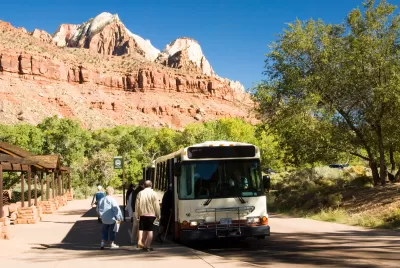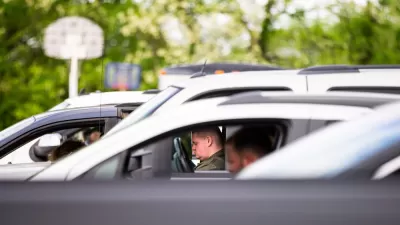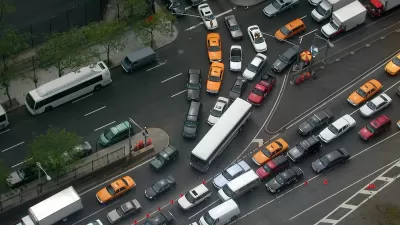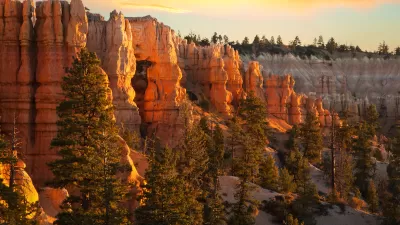Too often, national parks and other recreational spaces in the United States are difficult or impossible to access without a car. Some parks are working to change that.

In a piece in Millennial American Dream republished in Streetsblog USA, Michael Moore describes how Rocky Mountain National Park and Glacier National Park provide exemplary models for providing parks access to people who don’t own cars via bus shuttles.
By providing convenient transportation options, these parks reduce traffic congestion, minimize pollution, and make it easier for visitors to access hiking trails and attractions. Implementing similar shuttle services in popular US parks could significantly enhance accessibility and alleviate parking woes.
Moore also suggests making more in-park lodging, such as European-style hiking hostels, available to tourists to reduce the need to drive in and out. Additionally, parks can reduce economic barriers by providing affordable gear rentals and boosting connectivity to public transit. “Establishing reliable bus and train connections from major US cities and airports to lesser-known parks is crucial for achieving better access and dispersing visitor flow,” Moore writes.
Parks access shouldn’t be limited to people who own cars. “Implementing transit connections, alternative transportation options, in-park accommodations, small cabin hostels, refreshment options, gear rentals, and long-distance transit links can transform the way we experience nature in the US.”
FULL STORY: Making Hiking Accessible Without Cars

Study: Maui’s Plan to Convert Vacation Rentals to Long-Term Housing Could Cause Nearly $1 Billion Economic Loss
The plan would reduce visitor accommodation by 25,% resulting in 1,900 jobs lost.

North Texas Transit Leaders Tout Benefits of TOD for Growing Region
At a summit focused on transit-oriented development, policymakers discussed how North Texas’ expanded light rail system can serve as a tool for economic growth.

Why Should We Subsidize Public Transportation?
Many public transit agencies face financial stress due to rising costs, declining fare revenue, and declining subsidies. Transit advocates must provide a strong business case for increasing public transit funding.

Agreement Keeps NYC Congestion Pricing Alive Through Summer
The tolling program will continue while a court considers the city’s lawsuit against the Trump administration.

Private Donations Propel Early Restoration of Palisades Playground
Los Angeles has secured over $1.3 million in private funding to restore the Pacific Palisades playground months ahead of schedule, creating a modern, accessible space that supports community healing after recent wildfires.

From Blight to Benefit: Early Results From California’s Equitable Cleanup Program
The Equitable Community Revitalization Grant (ECRG) program is reshaping brownfield redevelopment by prioritizing projects in low-income and environmental justice communities, emphasizing equity, transparency, and community benefits.
Urban Design for Planners 1: Software Tools
This six-course series explores essential urban design concepts using open source software and equips planners with the tools they need to participate fully in the urban design process.
Planning for Universal Design
Learn the tools for implementing Universal Design in planning regulations.
Ascent Environmental
Borough of Carlisle
Institute for Housing and Urban Development Studies (IHS)
City of Grandview
Harvard GSD Executive Education
Toledo-Lucas County Plan Commissions
Salt Lake City
NYU Wagner Graduate School of Public Service





























